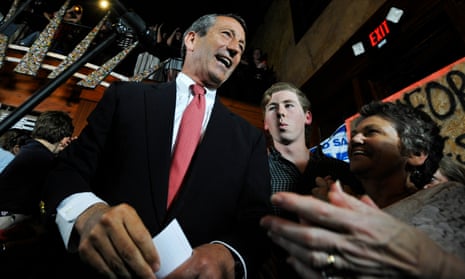Republican voters tossed out another vocal critic of Donald Trump in Tuesday’s primary elections, reinforcing the president’s hold over his party. Democrats, meanwhile, continued to elevate female candidates across the country in what has emerged as a central theme and rejoinder to Trump ahead of the November midterms.
Mark Sanford, an arch conservative critic of Trump, lost his bid for re-election in his coastal South Carolina district after the president attacked him on Twitter while Corey Stewart, an ardent Trump supporter who campaigned to protect Confederate monuments and praised a white nationalist, won the Republican Senate primary in Virginia.
Sanford, a three-term incumbent and former South Carolina governor, was defeated after Trump weighed in against him. Although Sanford is a member of the House Freedom Caucus and an ideological conservative, he has long been critical of Trump on issues such as tariffs and civil liberties. His opponent, state representative Katie Arrington, had criticized Sanford for being insufficiently loyal to the White House.
Trump went after Sanford on Twitter at 4.12pm, less than three hours before polls closed, stating: “Mark Sanford has been very unhelpful to me in my campaign to MAGA. He is MIA and nothing but trouble. He is better off in Argentina. I fully endorse Katie Arrington for Congress in SC, a state I love. She is tough on crime and will continue our fight to lower taxes. VOTE Katie!”
Trump’s comments were a veiled reference to when Sanford, then the governor of South Carolina, made headlines in 2009 pursuing an extramarital affair in Argentina with María Belén Chapur, a woman he described as his “soul mate”. Sanford infamously claimed at the time that he was hiking the Appalachian Trail.
The other key Republican contest of the night featured Stewart, a rightwing candidate who has appeared with white nationalists, winning the US Senate nomination in Virginia. He will face the incumbent Democrat, Tim Kaine, who was Clinton’s vice-presidential nominee, in November. Clinton narrowly eked out a victory in the swing state in 2016.
Stewart, a conservative firebrand, has taken a host of controversial positions, including birtherism, and was fired from a volunteer position by the Donald Trump presidential campaign in 2016 for protesting against the national Republican party after the release of the Access Hollywood tape. Stewart again received national attention in 2017 when he almost upset the establishment favorite Ed Gillespie for the Republican gubernatorial nomination in Virginia. He based his insurgent campaign on his support for Confederate monuments.
Trump wasted no time in offering Stewart his blessing in yet another example of the president swiftly embracing candidates who would once have been relegated to the fringe.
“Congratulations to Corey Stewart for his great victory for Senator from Virginia,” Trump tweeted early on Wednesday. “Now he runs against a total stiff, Tim Kaine, who is weak on crime and borders, and wants to raise your taxes through the roof. Don’t underestimate Corey, a major chance of winning!”
In a statement, Kaine described Stewart as “a cruder imitation of Donald Trump who stokes white supremacy and brags about being ‘ruthless and vicious’.” The National Republican Senatorial Committee declined to comment on Stewart’s win.
Some prominent Virginia Republicans openly expressed dismay at Stewart’s victory, suggesting they no longer recognized the Republican party amid the rise of yet another extreme candidate.
“I am extremely disappointed that a candidate like Corey Stewart could win the Republican nomination for US Senate,” Bill Bolling, the former lieutenant governor of Virginia, tweeted. “This is clearly not the Republican Party I once knew, loved and proudly served. Every time I think things can’t get worse they do, and there is no end in sight.”
At least one incumbent Republican fending off a sharp challenge from the right managed to hold on.
Representative Barbara Comstock defeated her primary opponent Shak Hill, who had sought to cast the Republican congresswoman as a “rabid Never Trumper”. Comstock had called for Trump to drop out of the presidential race following the release of the Access Hollywood tape, in which he bragged about kissing and groping women without their consent. Since Trump took office, however, she has been broadly supportive of his agenda.
Tuesday’s primaries also marked another big night for women, who have found a place on the Democratic ballot in November in record numbers.
Female candidates will represent Democrats in all four of Virginia’s competitive House districts in the general elections.
In the state’s suburban 10th congressional district, which Clinton won by 10 points, the Democratic favorite, Jennifer Wexton, won her primary easily. In another key race, the former CIA officer Abigail Spanberger won the Democratic nomination to face Dave Brat, a Tea Party insurgent who memorably beat the House majority leader Eric Cantor in 2014. The suburban Richmond district is considered a potential Democratic pickup in 2018.
In Nevada, philanthropist Susie Lee handily defeated her male opponents in the Democratic primary.
The non-partisan Cook Political Report noted that Democrats have nominated women in nearly 50% of 2018 House races, not counting incumbents, while Republicans have nominated women in only 16% of their primaries.
